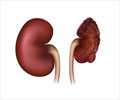- Medical-alert accessories lower the risk of kidney failure in chronic kidney disease (CKD) patients
- No significant differences were found in hospitalization rates or death due to the use of these accessories
- Research team calls for a randomized trial to evaluate the complete potential of the accessories to help patients with kidney dysfunction.
Medical-alert Accessories and CKD
Medical-alert accessories, usually a bracelet or necklace, assist in communicating vital information to healthcare providers, especially when the individual wearing it is unable to reliably convey them. However, the role of these medical-alert accessories in changing the providers’ awareness of CKD and how care is delivered, or the health outcomes of CKD patients have not been examined by any study so far. In a first, Dr. Jeffrey Fink of the University of Maryland School of Medicine has conducted a study involving 350 patients with stage 2-5, pre-dialysis CKD. “Since CKD is not often apparent to providers without appropriate blood testing, we thought providing patients with a medical-alert accessory with an indication of their CKD might serve as an alert to their special care needs,” said Dr. FinkRead More..
Study Design and Results
The 108 participants who were part of the pilot group were given a medical-alert bracelet or necklace with the diagnosis of CKD indicated and a website with safe CKD practices displayed. Subsequently, 242 patients, part of the observation group, received usual care. The frequency of safety events and adverse outcomes in all the participants were reviewed during their annual visits.The respective median follow-up of both the pilot and observation groups were 4.3 and 3.1 years. Reports following the annual visits which included the frequency of safety events or any inadvertent harm from medical therapy were not different in both the groups.
A 62% lower risk of developing kidney failure, after adjustments, was found to be associated with wearing a medical-alert accessory. However, no significant difference in rates of hospitalization or death was found between the group that used the accessory and the observation group.
“We were hoping to show that provision of the accessory might show a reduction in adverse safety events but this was not the case in this relatively small sample. So any potential reduction in poor outcomes associated with the medical alert accessory did not appear to be mediated through a reduction in safety events,” said Dr. Fink.
On what the study promises for the future, he added, “However, this pilot study suggests that provision of the medical-alert accessory has the potential to lead to improved outcomes like the reduced incidence of end-stage kidney disease.”
Reference:
- Chronic Kidney Disease Patients may benefit from Medical-alert Bracelets - (https://cjasn.asnjournals.org/content/early/2019/06/05/CJN.13531118)
















